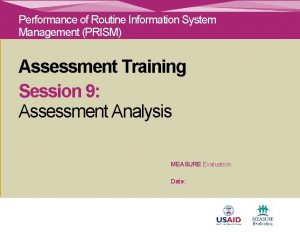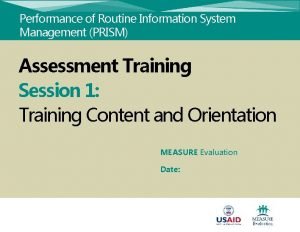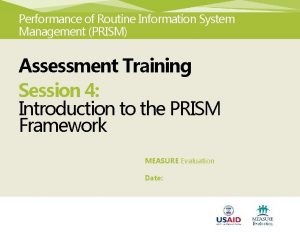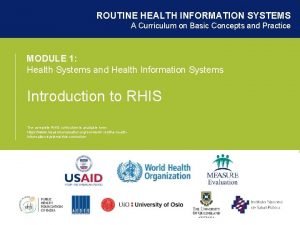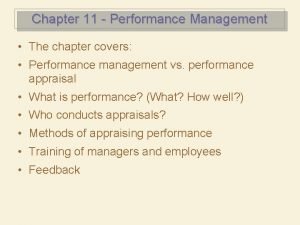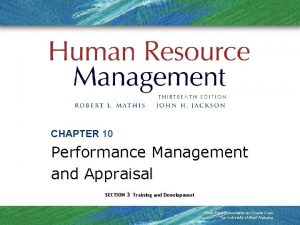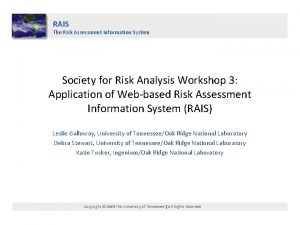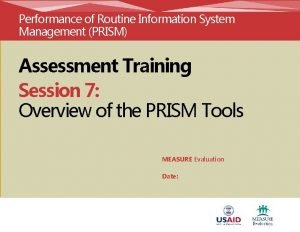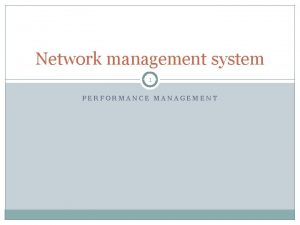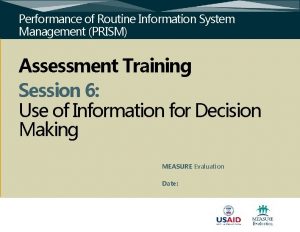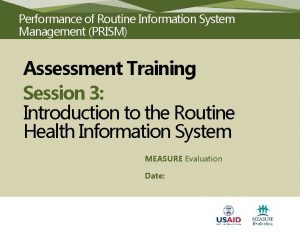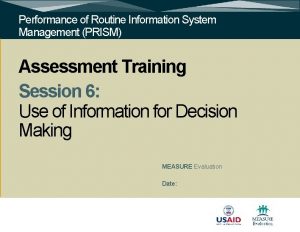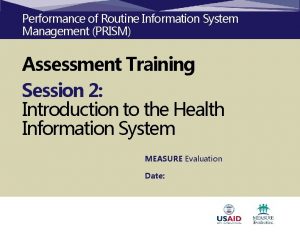Performance of Routine Information System Management PRISM Assessment










- Slides: 10

Performance of Routine Information System Management (PRISM) Assessment Training Session 4: Introduction to the PRISM Framework MEASURE Evaluation Date:

Session objectives • Define “good” RHIS performance • Demonstrate understanding of the three RHIS determinants • Explain the components and uses of the PRISM Framework • Identify the factors influencing RHIS performance • Describe the PRISM Conceptual Model 2

Defining RHIS performance means both the production of high-quality information and the use of information for decision making.

What influences RHIS performance? Many RHIS reform efforts were adopted to improve the use of information for better health system performance But there was no consistent way to measure whether the RHIS had improved over time Required better understanding of the factors influencing RHIS performance Need for broader Production of “systems” high-quality thinking data Use of information for decision making Performance of Routine Information System Management (PRISM)

The PRISM Framework

Definitions of the PRISM Framework’s determinants Technical • What does each RHIS • determinant • mean? Standard indicators Trained people Well-designed data collection forms • Systems • User-friendly reporting forms • Processes and methods Organizational Behavioral • Promotion of an information culture • Infrastructure • Availability of resources • Roles and responsibilities • Training • Supportive supervision • Motivation • Attitudes and values • Skills • Confidence • Sense of responsibility • Empowerment and accountability

The PRISM Conceptual Model: A comprehensive picture of RHIS performance INPUTS PROCESSES OUTPUTS OUTCOMES IMPACT RHIS determinants Technical factors: • Complexity of reporting forms, procedures • HIS design • Computer software • Information technology complexity Organizational factors: Critical management functions & information needs • Governance • Planning • Training • Supervision • Quality • Finance • Promotion of a culture of information • Availability of resources Behavioral factors: • Level of knowledge of content of HIS forms • Data-quality checking skills • Problem-solving for HIS tasks • Competence in HIS tasks • Confidence levels for HIS tasks • Motivation RHIS processes: • Data collection • Data transmission • Data processing • Data analysis • Data quality check • Feedback Improved RHIS performance • Data quality • Information use Improved health system performance Improved health status

Analyzing a problem and its causes Example • Problem: Data are not being transmitted on schedule. • Causes: • Technical • • Organizational • • The reporting form is complex and required review of multiple register books There is no incentive to submit reports on time; no standard operating procedure (SOP) on reporting communicated formally Behavioral • Staff do not have sufficient skill to prepare reports using data from different register books and health cards.

How to access the PRISM Series This slide deck is one of nine in the PRISM Series Training Kit, which also includes a Participant’s Manual and a Facilitator’s Manual. Also in the PRISM Series is a Toolkit (the centerpiece of the series) and a User’s Kit. The PRISM Series is available in its entirety on MEASURE Evaluation’s website, here: https: //www. measureevaluation. org/prism

MEASURE Evaluation is funded by the United States Agency for International Development (USAID) under the terms of Cooperative Agreement AID-OAA-L-14 -00004. It is implemented by the Carolina Population Center, University of North Carolina at Chapel Hill, in partnership with ICF International; John Snow, Inc. ; Management Sciences for Health; Palladium; and Tulane University. The views expressed in this presentation do not necessarily reflect the views of USAID or the United States government. www. measureevaluation. org
 Performance of routine information system management
Performance of routine information system management Performance of routine information system management
Performance of routine information system management Performance of routine information system management
Performance of routine information system management District level routine information system
District level routine information system Behaviorally anchored rating scales
Behaviorally anchored rating scales Disadvantages of bell curve in performance appraisal
Disadvantages of bell curve in performance appraisal The risk assessment information system
The risk assessment information system Prism assessment tool
Prism assessment tool Network performance management definition
Network performance management definition Agile infomix
Agile infomix Dimensions of performance management system
Dimensions of performance management system
